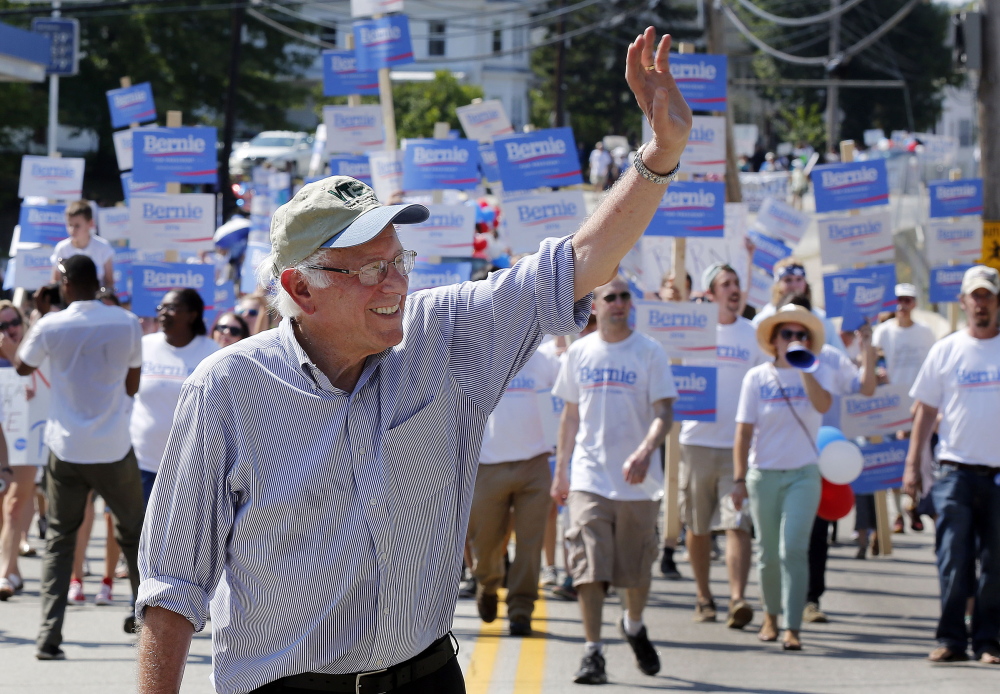Bernie Sanders is fast expanding his political staff, crafting a delegate strategy and cultivating a vast volunteer corps and digital fundraising network that he believes can seriously challenge Hillary Rodham Clinton for the Democratic presidential nomination.
Dismissed only a couple of months ago as a fringe candidate, the self-described democratic socialist senator from Vermont has proven in recent weeks that he is a contender to win the Iowa caucuses and New Hampshire primary. Now Sanders is plotting his path to the nomination in what he anticipates will be a long race for delegates.
With Clinton falling in the polls and top Democrats increasingly concerned about her electability, Sanders is trying to take advantage by assembling a grass-roots machine modeled in part after Obama’s 2008 campaign. Yet many serious obstacles stand between him and the nomination – and Sanders’ advisers acknowledge that their calculations would be complicated further if Vice President Joe Biden enters the race.
The growing Sanders operation in the early states now nearly rivals the Clinton campaign. He has 54 paid staffers in Iowa and 38 in New Hampshire and dozens more coming on elsewhere, compared with 78 field staffers in Iowa and 50 in New Hampshire for Clinton. Both are far larger than any Republican campaign.
SWIFTLY EXPANDING HIS PRESENCE
Sanders is also moving swiftly to expand his presence in South Carolina and Nevada and boost his standing among black and Latino voters. He is organizing in four states – Colorado, Massachusetts, Minnesota and Vermont – with primaries or caucuses on March 1 that his team considers opportunities for victory. He also is targeting Illinois, Michigan and Ohio, which vote later in March and where his advisers think his appeal to working-class whites can be decisive.
The Sanders campaign is training tens of thousands of volunteers to organize in their communities, expanding its social media presence and erecting an online fundraising apparatus to fully exploit every spurt of excitement. The senator is preparing to make major policy announcements – as Clinton has done this summer – designed to go deeper than the insurgent agenda he lays out in his stump speech.
‘THE BASE EXPANDER’
Sanders also is beginning to press the case to Democratic leaders that he, not Clinton, would be the strongest nominee because of the enthusiasm his populist message generates. His advisers have been encouraged by recent polls showing Sanders trouncing Clinton among voters under 30 years old or whose annual family incomes are less than $30,000; both demographics traditionally vote in low numbers.
“He’s the base expander,” said Sanders campaign manager Jeff Weaver.
“You start communicating his message with people who haven’t heard it yet, it will resonate. We have a lot of crawl space here,” added Tad Devine, Sanders’s top strategist.
Weaver and Devine laid out the Sanders playbook in a nearly 90-minute, on-the-record interview with The Washington Post this week at the campaign’s office on Capitol Hill. A key part of their calculation, as for Obama in 2008, is amassing delegates in populous states like Texas even if Clinton wins. According to Democratic rules, delegates are allocated proportionately based on vote totals by congressional district.
RALLIES DRAW THOUSANDS
Sanders’s swift rise – the latest public polls show him leading Clinton in New Hampshire, statistically tied with her in Iowa and gaining on her nationally – has startled the political establishment. His unabashedly progressive message of taking on “the billionaire class” has drawn thousands of people – in some cases tens of thousands – to his rallies. Clinton, by contrast, generally campaigns in smaller venues and has sometimes struggled to fill them.
“He has already surpassed expectations,” said David Axelrod, a former top adviser to President Obama. “Bernie has been very effective. He’s completely authentic, he is earnest, and he’s been talking about these issues all his life. But the challenge now is to transform excitement and energy into delegates and palpable progress.”
Weaver and Devine were candid about the hurdles for Sanders. One of the biggest is his low standing with minority voters, especially African Americans, relative to Clinton. She and her husband, former president Bill Clinton, have spent decades cultivating relationships with blacks and other key Democratic constituencies.
“Bernie’s not well known in the African American community – period. That’s an issue,” Weaver said.
Sanders, 74, will try to share his personal story with black voters this fall, including on a four-day southern swing starting Saturday: He grew up poor in a Brooklyn tenement, fought for civil rights as a college student and has advocated loudly for economic and social justice through three decades in elected office. He also hopes his calls for a $15-an-hour national minimum wage and free college tuition will resonate.
Copy the Story LinkSend questions/comments to the editors.



Success. Please wait for the page to reload. If the page does not reload within 5 seconds, please refresh the page.
Enter your email and password to access comments.
Hi, to comment on stories you must . This profile is in addition to your subscription and website login.
Already have a commenting profile? .
Invalid username/password.
Please check your email to confirm and complete your registration.
Only subscribers are eligible to post comments. Please subscribe or login first for digital access. Here’s why.
Use the form below to reset your password. When you've submitted your account email, we will send an email with a reset code.